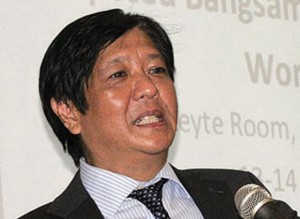. on Wednesday grilled the government’s chief peace negotiator, Miriam Coronel-Ferrer, on the true nature and actual functions of a fiscal body that is to be created under the proposed Bangsamoro Basic Law (BBL).
The severe questioning took place during the last public hearing of the Senate Committee on Local Government, headed by Marcos, regarding the BBL, or Senate Bill 2408.
The senator tried but failed to elicit satisfactory answers from Ferrer, a resource person in the public hearing, when asked about the functions and roles of the Inter-Governmental Fiscal Policy Board (IGFPB), which is sought to be formed under the BBL.
He was told that the functions of the IGFPB are not elaborated on in the proposed law because they are just provided for the fiscal board itself.
“But there are some elements across the different sections that refer to the functions of this [board],” Ferrer said.
Section 35 of Article 12 of the BBL provides for the creation of such fiscal board that will address revenue imbalances and fluctuations in regional financial needs and revenue-raising capacity of the Bangsamoro.
Marcos also asked Ferrer how members of the IGFPB are to decide on issues such as review of a block grant; periodic review of taxing powers; and tax base and rates of the Bangsamoro government.
She said the concept of the fiscal board is similar to that of the Local Government Code on inter-government relations but is developed further in the BBL to provide a forum for national-government and Bangsamoro officials on matters that relate to fiscal autonomy.
But when asked by Marcos whether there is a body equivalent to the IGFPB in the Local Government Code, she replied, “There is a section [there] called inter-governmental relations.”
“Yes, but the [code] does not specifically talk about an Inter-Governmental Fiscal
Policy Board,” the senator also told Ferrer, who replied, “… the principle is the same, to be able to enhance that kind of harmonious relationship…”
Marcos said the Senate is scrutinizing the proposed fiscal board because of its vagueness.
Palace bats for consensus
Malacañang also on Wednesday said it would bat for a “consensus” BBL than return to the path of war amid fears by some sectors that Congress will likely deliver a watered-down version of the bill.
In a news briefing, its spokesman Edwin Lacierda said they are amenable to whatever changes the two Houses of Congress may make in the draft bill as long as the bill is not diluted.
“It is a recognition that there will be some, and anticipation that there will be some, provisions that may be changed based on the purview and the view of the legislators.
But is the alternative, going back to war, a better option than seeing a draft BBL?” Lacierda asked.
“It may not necessarily be a watered-down BBL. It is a consensus BBL where, in the mind of the legislators, all stakeholders within and outside of the ARMM [Autonomous Region in Muslim Mindanao] can find common agreement with,” he pointed out.
While the Palace was apparently displeased by failure of Congress to pass the BBL before it adjourned, Lacierda said the break will provide sufficient time for everyone to go down to the grassroots and muster the widest public support for the BBL.
“So hopefully, by July, when they [lawmakers] come back again, things will be a lot, lot clearer on the BBL because all the people will be engaged on the ground, explaining the BBL, by both the [legislators] and also by all the stakeholders. So that is a better alternative,” he told reporters.
Lacierda said he believes that Moro Islamic Liberation Front peace panel chairman Mohagher Iqbal and MILF chief Al Haj Murad Ebrahim “feel the same way.”
“We need to fight for this Bangsamoro Basic Law, which is again, like we’ve always maintained on both sides, the framework for peace and development in Muslim Mindanao,” he added.
Lacierda said he does not know whether a substitute bill being proposed by Marcos would be “better.”
“[Marcos] claims it’s going to be better, but the BBL that we have right now is a product of consensus and negotiations with all the stakeholders for several years, drawn from experience, not just several days of consulting on the ground. These are experiences gathered from years and years of conflict and negotiations and discussions,” he noted.
Marcos said he will present the substitute bill by July, when he will have finished writing down the committee report on the BBL and the corresponding alternative measure.


